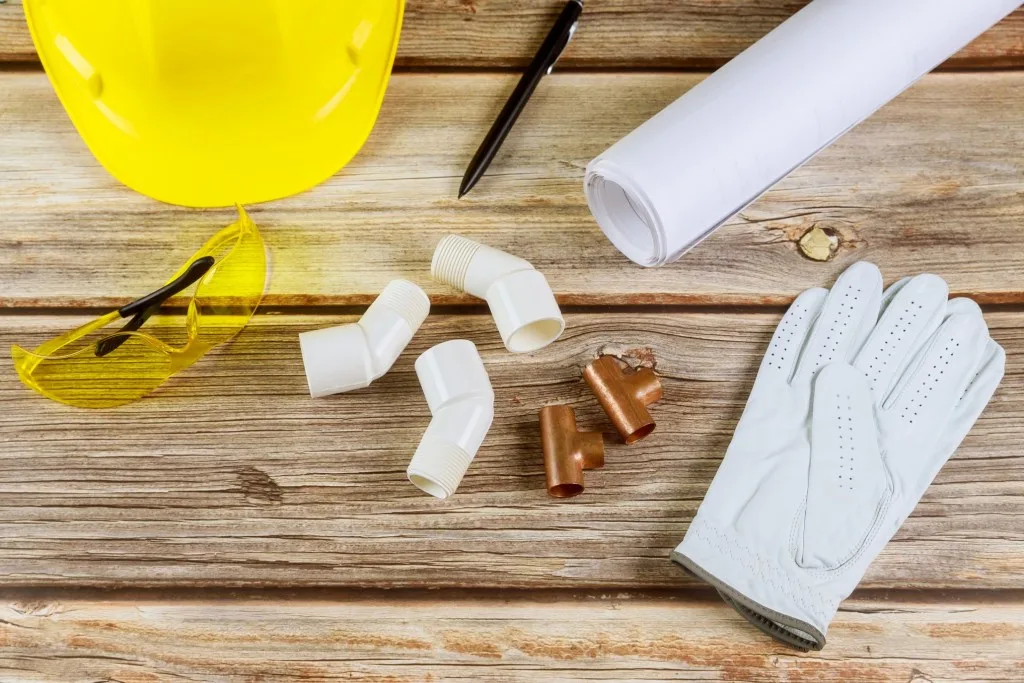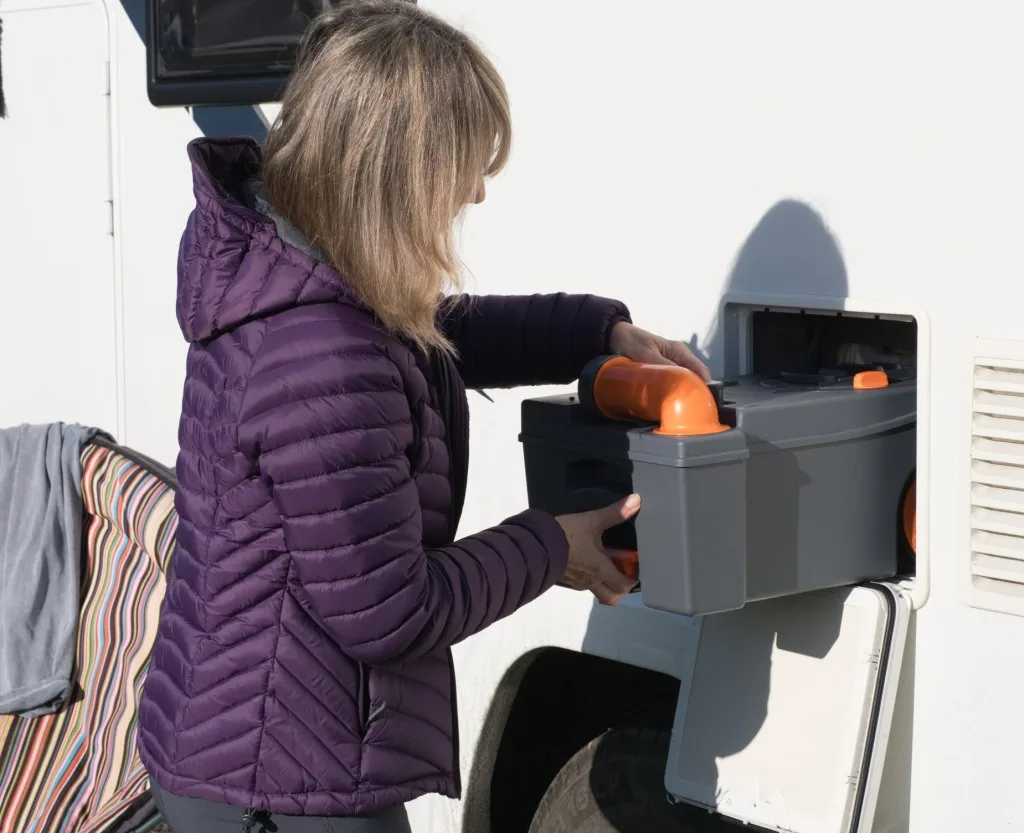RV plumbing issues can cause you to pack up camp and head home from your trip in a hurry. Whether you want to or not, you can’t ignore problems with your RV’s plumbing system.
The smells will likely only grow, and conditions worsen if you don’t address them.
If you know some issues, you can prepare for them. So let’s look at the most common RV plumbing issues, so you don’t have to pack up camp early. Let’s get started.
What Type of Plumbing Is Used in RVs?
Most modern RVs (those made in the last 10 to 15 years) use PEX tubing for the water system. You’ll find this same tubing in residential homes and commercial buildings. It’s flexible, easier to install, and cost-effective.
When liquids go down the drain, whether into the gray or black tank, they’ll most often travel through PVC piping. These durable, lightweight pipes can last for years.
Pro Tip: Learn more about your RV plumbing system by uncovering Is RV Grey Water That Bad?
How Does RV Plumbing Work?
Black and gray water travel through the PVC pipe and into the respective tank, typically mounted under the RV. Gray tanks hold any water that goes down a shower or sink faucet, and black tanks hold anything that goes down a toilet.
RV plumbing is very different from standard residential plumbing. Many residential systems connect to a sewer network maintained by the city or other governing agency. Some use a septic system to process the waste and dissolve it into the ground.
However, an RV’s plumbing system sends the wastewater into the two temporary holding tanks. They allow you to store the waste until you find a dump station.

What Are the Most Common RV Plumbing Issues?
If you RV for long enough, you may learn how to repair parts of your plumbing system on your own. Plumbing issues aren’t uncommon in RVs, so here are a few RV plumbing issues to know about.
Keep in mind: Here are the systems that break first in an RV (according to a mechanic).
Water Line Issues
If you’ve ever taken a peek into the bowels of your RV, you’ll see a complex mess of water lines. These chaotic lines are prone to issues. With water flowing to showers, outside kitchens, and toilets all over your RV, it has a lot of connections.
Each of these connections requires fittings to change directions and connect pipes. Loose fittings or cracks in the water line can develop over time.
Even the smallest of leaks can cause an extensive amount of damage to your RV. These issues can go undetected for quite some time.
Water Pump Issues
An RV’s water pump maintains pressure in the lines to pump water from the freshwater tank to the faucet, shower head, or toilet. However, water pumps can fail or have issues maintaining pressure.
If you spend most of your time camping in places where you use your water pump, this can leave you searching for a new one. However, you may not use your water pump all that often if you spend most of your time camping in campgrounds with full hookups or water connections at the campsite.
Toilet Issues
It doesn’t matter if you’re in an RV or a residential home; toilet issues are never fun. RVers often experience clogs and other problems with their toilets from not using enough water. As a general rule, you can’t really use too much water when flushing a toilet.
Now you shouldn’t use gallons of water with each flush, but using a sensible amount of water can help prevent clogs in your black tank and make dumping your tanks easier.
Dirty Truth: Avoid composting toilets if you don’t like poop.

How Do You Find a Plumbing Leak in an RV?
If your RV leaks, you want to catch it early. A vast majority of your plumbing is under your RV and behind walls. This can make it difficult to detect leaks until it’s too late.
However, many RVers will rarely use their RV’s city connection for water. They’ll instead fill up their freshwater tank and use their water pump.
If you have a leak in the system or the water pump has trouble keeping pressure in the lines, the water pump will cycle. If you hear your RV water pump cycling regularly with no water running, you probably have a leak or issue with your plumbing system.
First, start investigating all of your connections and water lines. Look on the ground under your RV for any signs of water pooling. You may need to take down false walls in your under-storage to inspect the fittings on your water lines. If you can’t track down the leak, you may want to call a professional.
Pro Tip: Got a clog in your RV plumbing? Before you try to fix it discover Can I Use Drano in My RV?
What Size Is RV Plumbing?
RV manufacturers typically use three-eighths or one-half-inch PEX tubing for RV plumbing water lines. Depending on your manufacturer, these pipes will be color-coded.
Red tubing is for hot water, and blue tubing is for cold water. However, not all manufacturers will use this system and opt for clear pipes instead.
What Size Is RV Sewer Pipe?
An RV sewer pipe is typically 3 inches in diameter. This is a standard size, and most RV sewer hoses and bayonet-style fittings will have no trouble connecting to them.
However, just because your RV sewer pipe has a 3-inch diameter doesn’t mean the sewer connection at a dump station will. This is often why many RVers use four-in-one attachments to fit practically any side dump station connection.
Is It Better to DIY RV Plumbing Issues or Hire a Professional?
Hiring a professional can get rather expensive, especially if you constantly deal with plumbing issues. However, trying to DIY a repair out of your league can also cause a costly mistake. Know your limits and avoid tackling a project beyond your abilities.
Don’t be too proud to call a professional. The faster you get your RV plumbing issues fixed, the sooner you can hit the road.
What’s your worst RV plumbing issue story? Tell us in the comments!
Discover the Best Free Camping Across the USA
To be honest with you, we hate paying for camping. There are so many free campsites in America (with complete privacy).
You should give it a try!
As a matter of fact, these free campsites are yours. Every time you pay federal taxes, you’re contributing to these lands.
Become a FREE CAMPING INSIDER and join the 100,000 campers that love to score the best site!
We’ll send you the 50 Best Free Campsites in the USA (one per state). Access the list by submitting your email below: